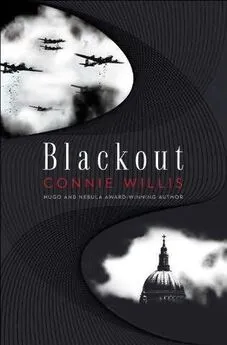Connie Willis - Blackout
- Название:Blackout
- Автор:
- Жанр:
- Издательство:неизвестно
- Год:неизвестен
- ISBN:нет данных
- Рейтинг:
- Избранное:Добавить в избранное
-
Отзывы:
-
Ваша оценка:
Connie Willis - Blackout краткое содержание
In her first novel since 2002, Nebula and Hugo award-winning author Connie Willis returns with a stunning, enormously entertaining novel of time travel, war, and the deeds—great and small—of ordinary people who shape history. In the hands of this acclaimed storyteller, the past and future collide—and the result is at once intriguing, elusive, and frightening.
Oxford in 2060 is a chaotic place. Scores of time-traveling historians are being sent into the past, to destinations including the American Civil War and the attack on the World Trade Center. Michael Davies is prepping to go to Pearl Harbor. Merope Ward is coping with a bunch of bratty 1940 evacuees and trying to talk her thesis adviser, Mr. Dunworthy, into letting her go to VE Day. Polly Churchill’s next assignment will be as a shopgirl in the middle of London’s Blitz. And seventeen-year-old Colin Templer, who has a major crush on Polly, is determined to go to the Crusades so that he can “catch up” to her in age.
But now the time-travel lab is suddenly canceling assignments for no apparent reason and switching around everyone’s schedules. And when Michael, Merope, and Polly finally get to World War II, things just get worse. For there they face air raids, blackouts, unexploded bombs, dive-bombing Stukas, rationing, shrapnel, V-1s, and two of the most incorrigible children in all of history—to say nothing of a growing feeling that not only their assignments but the war and history itself are spiraling out of control.
Blackout - читать онлайн бесплатно полную версию (весь текст целиком)
Интервал:
Закладка:
The seventeenth-century cherubs had been, too, and the nave’s chandeliers and most of the monuments in the south aisle. “Some of them were too heavy to move, so we’ve put sandbags round them,” Mr. Humphreys said, leading her past a stairway with a chain across it and a notice: To the Whispering Gallery. Closed to Visitors.
And so much for the Whispering Gallery, Polly thought as the verger led her into the wide central crossing beneath the dome, where there was another chained staircase.
“This is the transept,” he said. “It forms the crosspiece of the cathedral.” He led her into it to show her the monument to Lord Nelson, or rather, the stack of sandbags hiding it, and several other piles of sandbags concealing statues of Captain Robert Scott, Admiral Howe, and the artist J. M. W. Turner. “The south transept is chiefly interesting for the carved oak doorcase by Grinling Gibbons, which unfortunately-”
“Has been removed for safekeeping,” Polly murmured, following him from the transept into the choir and the apse, where he pointed out the organ (removed for safekeeping), the shrouded statue of John Donne (in a shroud of sandbags in the Crypt), the High Altar, and the stained-glass windows.
“We’ve been very lucky so far,” Mr. Humphreys said, pointing up at them. “They’re too large to board up, but we haven’t lost a single window.”
You will, Polly thought. By the end of the war they’d all have been smashed. The last one had been taken out by a V-2 that had crashed nearby.
Mr. Humphreys led her back down the other side of the choir, pointing out the buckets of water and stirrup pumps lined against the wall. “Our greatest worry is fire. The underlying structure’s of wood, and if one of the roofs were to catch fire, the lead would run down into the cracks between the stones, and they’d burst as they did when the first St. Paul’s burned. It was utterly destroyed during the Great Fire of London, when this entire part of the city burned.”
And will again three months from now, Polly thought. She wondered if Mr. Humphreys was part of the fire watch. He looked too old, but then again, the Blitz had been a war of old men and shopgirls and middle-aged women.
“But we shan’t let that happen again,” he said, answering her question. “We’ve formed a band of volunteers to keep watch for incendiaries on the roofs. I’m on duty tonight.”
“Then I shouldn’t keep you,” Polly said. “I should go.”
“No, no, not till I’ve shown you my favorite monument,” Mr. Humphreys said, dragging her into the north transept. He made her look at the Corinthian columns and the oak doors of the north porch. “And this is the monument to Captain Robert Faulknor,” he said, pointing proudly at another pile of sandbags. “His ship was badly damaged. She’d lost most of her rigging and couldn’t fire, and the La Pique was coming athwart her. Captain Faulknor courageously grabbed her bowsprit and lashed the two ships together and used the La Pique’s guns to fire on the other French ships. His brave action won the battle. Unfortunately he never knew what he’d accomplished. He was shot through the heart the moment after he’d bound the two together.” He shook his head sadly. “A true hero.”
I’ll need to tell Michael Davies about him, Polly thought, and wondered where he was now. He was to have left just after she did, which meant he was in Dover, observing the evacuation efforts. But here in this time, that had happened three months ago, and his next assignment, Pearl Harbor, which he’d leave for as soon as he returned from Dover, wouldn’t happen here for more than a year.
“It’s such a pity you can’t see the monument,” Mr. Humphreys said. “Wait, I’ve just thought of something,” he said, and led her back down the nave. The cathedral had lost its golden glow and looked gray and chilly, and the side aisles were already in shadow. Polly stole a glance at her watch. It was after four. She hadn’t realized how late it was.
Mr. Humphreys was taking her to the admissions desk. It had a number of pamphlets on it, colored prints of the The Light of the World for sale for sixpence apiece, a box marked Donations to the Minesweepers Fund, and a wooden rack filled with picture postcards. “I think we may have a photograph of Captain Faulknor’s monument,” he said, searching through postcards of the Whispering Gallery, the organ, and a three-tiered Victorian monstrosity that had to be the Wellington Monument. “Oh, dear, we don’t seem to have one of it. What a pity! You must come back and see it when the war’s over.”
The side door clanged, and a sharp-faced young man came in, wearing a dark blue coverall and carrying a tin helmet and a gas mask. “So they got the bomb out all right, did they, Mr. Humphreys?” he asked the verger.
He nodded. “You’re a bit early, Langby. You don’t come on duty till half past six.”
“I want to take a look at the chancel roof pump. It’s been giving a bit of trouble. Have you the key to the vestry?”
“Yes,” Mr. Humphreys said. “I’ll be there in a moment.”
“I’m keeping you from your duties,” Polly said. “Thank you for showing me the cathedral.”
“Oh, but you mustn’t go yet. There’s one last thing you must see,” he said, leading her over to the south aisle.
No doubt another pile of sandbags, Polly thought, following him, but it wasn’t. He’d led her back to The Light of the World, the painting now only dimly visible in the gloom.
Mr. Humphreys said reverently, “Do you see how, now that the light’s fading, the lantern seems to glow?”
It did. A warm orange-gold light spread from it, lighting Christ’s robe, the door, the weeds that had grown up around it.
“Do you know what Dean Matthews said when he saw that glow? He said, ‘He’d better not let the ARP warden catch him with that lantern.’” Mr. Humphreys chuckled. “A fine sense of humor, the dean has. It’s a great help in times like these.”
The door clanged open again and another member of the fire watch came in and walked swiftly up the nave. “Humphreys!” Langby called from the transept.
“I’m afraid I must be going,” Mr. Humphreys said. “If you’d care to stay and look round a bit more…”
“No, I should be getting home.”
He nodded. “Best not to be out after dark if one can help it,” he said and hurried toward Langby.
He was right. It was a long way to Kensington, and she had to find somewhere open where she could get supper before she went back. There was no way she could make it through another night without having eaten. And the raids tonight began at 6:54. She needed to go.
But she stayed a few minutes longer, looking at the painting. Christ’s face, in the dimming light, no longer looked bored, but afraid, and the woods surrounding him not only dark but threatening.
Best not to be out after dark if one can help it, Polly thought, and then, looking at the locked door, I wonder if that’s the door to an air-raid shelter.
Wouldn’t it be lovely if it was true?
– LONDONER, 7 MAY 1945London-7 May 1945
WHEN THE THREE GIRLS TURNED ONTO THE ROAD THAT led to the Underground station, it was deserted. “What if it was a false alarm and the war’s not really over?” Paige asked.
“Don’t be silly,” Reardon said. “It was on the wireless.”
“Then where is everyone?”
“Inside,” Reardon said. “Come along.” She started down the street.
“Do you think it could be another false alarm, Douglas?” Paige asked, turning to her.
“No,” she said.
“Do come on,” Reardon said, motioning them to hurry. “We’ll miss all the fun.”
But when they got inside the station, there was no one there either. “They’re down on the platform,” Reardon said, pushing through the wooden turnstile, and when there was no one on the platform either, “They’re all in London already, just like we’d be, if it weren’t for Colonel Wainwright’s gout. Why couldn’t his big toe have waited till next week to get inflamed? Only just think,” Reardon smiled beatifically, “we’ll never have to put up with Colonel Wainwright again.”
“Unless the war’s not actually over,” Paige said. “Remember last week, when West Ham rang up and said General Dodd had told them it was all over? If this is another false alarm, we’ll not only look like complete idiots, we’ll be put on report. We should have rung up HQ in London and verified it.”
“Which would have made us even later,” Reardon said, “and we’ve missed hours, as it is.”
“But if it hasn’t ended…” Paige said doubtfully. “Perhaps we should ring them up now, before we-”
“We’ll miss the train and the end of the war,” Reardon said, looking down the track toward where the train was coming. “It’s eight o’clock. Don’t you agree, Douglas?”
“Actually, it’s twenty past eight,” Douglas said. And every minute we stand here is one less minute I have to see the celebrations, she thought.
The train pulled in. Reardon said, “Stop fretting and come along.”
Paige turned to Douglas. “What do you think, Douglas?”
“It’s not a false alarm,” she said. “The Germans have surrendered. The war’s over. We’ve won.”
“Are you certain?”
More certain than you can possibly imagine, she thought. Here was something she’d never expected from her research, that it could be VE-Day, and the contemps wouldn’t know it. Or, rather, VE-Day eve. VE-Day, with its speeches by Churchill and the King and its thanksgiving services at St. Paul’s, had been-correction, wouldn’t be till-tomorrow, but the celebrating had begun today, and the party would go on all night.
“Douglas is certain,” Reardon was saying. “I’m certain. The war’s over. Now get on the train.” Reardon grabbed Paige’s arm and propelled her onto the car, and she got on with them.
The car was empty, too, but Paige didn’t seem to notice. She was looking at the tube map on the wall of the car. “Where should we go when we get there, do you think? Piccadilly Circus?”
“No, Hyde Park,” Reardon said. “Or St. Paul’s.”
“Where do you think people will be, Douglas?” Paige asked.
All of the above, she thought, plus Leicester Square and Parliament Square and Whitehall and every street in between. “Trafalgar Square is where one usually goes for that sort of thing,” she said, thinking of which place would have the easiest connection to her drop.
“What sort of thing?” Paige asked, and it was clear she thought nothing like this had ever happened before.
And she may be right, she thought. “I meant it’s where people have gathered in the past after military victories-the Battle of Trafalgar and the siege of Mafeking and all that.”
“This isn’t only a military victory,” Reardon said. “It’s our victory as well.”
“If it’s actually happened,” Paige said, peering out the window as they pulled into the next stop, which was deserted as well. “Oh, dear, I’m afraid it is a false alarm, Douglas.”
“No, it’s not,” she said firmly, though privately she was beginning to worry, too. Historical accounts had said the victory celebration had begun as soon as the news of the German surrender came over the wireless at three o’clock. Could they have got that wrong? Could everyone have doubted the news like Paige? There had been a number of false alarms, and everyone had been on tenterhooks for the last two weeks.
And it wouldn’t be the first time the historical record had been wrong or incomplete. But VE-Day was well documented. And the historical accounts said people should be pouring onto the train by now, waving Union Jacks and singing “When the Lights Go on Again All Over the World.”
Читать дальшеИнтервал:
Закладка:

![Jane_BlackCat - Понять не поздно... [СИ]](/books/1148838/jane-blackcat-ponyat-ne-pozdno-si.webp)
![Jane_BlackCat - За краем Вечности [СИ]](/books/1148839/jane-blackcat-za-kraem-vechnosti-si.webp)

